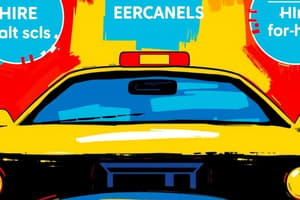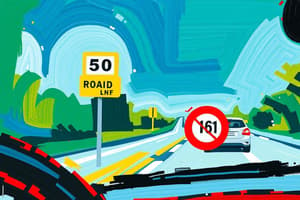Podcast
Questions and Answers
If you are approaching an intersection with a non-operating signal, what should you do?
If you are approaching an intersection with a non-operating signal, what should you do?
Stop before entering the intersection, yield the right-of-way to cross-traffic, and proceed with caution.
What is the maximum speed limit in urban residential areas?
What is the maximum speed limit in urban residential areas?
30 mph or posted speed limit.
With any turning vehicle, the rear wheels follow a _________ than the front wheels.
With any turning vehicle, the rear wheels follow a _________ than the front wheels.
shorter path
What increases the likelihood of an accident?
What increases the likelihood of an accident?
What should you do if your vehicle's brakes suddenly fail?
What should you do if your vehicle's brakes suddenly fail?
According to Indiana law, who is required to use seat belts?
According to Indiana law, who is required to use seat belts?
What should you do if visibility is reduced to near zero due to fog?
What should you do if visibility is reduced to near zero due to fog?
When must drivers use low-beams?
When must drivers use low-beams?
What must you do when you see a stationary emergency vehicle with flashing lights?
What must you do when you see a stationary emergency vehicle with flashing lights?
When operating a vehicle with a steering wheel interlock system, never turn _________ while the vehicle is in motion.
When operating a vehicle with a steering wheel interlock system, never turn _________ while the vehicle is in motion.
Which statement is true when driving on highways?
Which statement is true when driving on highways?
What must you do if you are involved in an accident?
What must you do if you are involved in an accident?
What should you not do when making a U-turn?
What should you not do when making a U-turn?
Defensive drivers stay _________ behind the vehicle ahead.
Defensive drivers stay _________ behind the vehicle ahead.
What should you do if another vehicle is passing you on the left?
What should you do if another vehicle is passing you on the left?
What is the maximum speed limit in a highway work zone?
What is the maximum speed limit in a highway work zone?
To avoid glare from oncoming headlights, where should a driver focus?
To avoid glare from oncoming headlights, where should a driver focus?
What should you do if a tornado is nearby?
What should you do if a tornado is nearby?
It is dangerous and illegal to try to pass other vehicles when _________ of an intersection, railroad crossing, bridge, viaduct, or tunnel.
It is dangerous and illegal to try to pass other vehicles when _________ of an intersection, railroad crossing, bridge, viaduct, or tunnel.
If the speed limit is 50 mph or greater, you must give a proper turn signal ________ before turning or changing lanes.
If the speed limit is 50 mph or greater, you must give a proper turn signal ________ before turning or changing lanes.
If you are driving near a school, you must slow down to _________ for the school zone.
If you are driving near a school, you must slow down to _________ for the school zone.
What is the first rule of a safe and legal turn?
What is the first rule of a safe and legal turn?
What must you do if you are approaching a stop sign?
What must you do if you are approaching a stop sign?
Flashcards are hidden until you start studying
Study Notes
Intersection Signals
- Stop before entering intersections with non-operating signals.
- Yield right-of-way to cross-traffic after stopping.
Speed Limits
- In urban residential areas, maximum speed is 30 mph or posted limit.
- Maximum speed limit in highway work zones is 45 mph.
Turning Mechanics
- Rear wheels of a turning vehicle follow a shorter path than front wheels.
- Long vehicles require larger swing for turns.
Impaired Driving
- Accidents are more likely under the influence of alcohol, drugs, or prescription medications.
Brake Failures
- In case of brake failure, shift to a lower gear and pump the brake pedal quickly.
Seat Belt Requirements
- Indiana law mandates that drivers and passengers wear seat belts whenever the vehicle is in operation.
Fog Driving Protocol
- If fog reduces visibility to near zero, pull off the road and stop; use headlights and emergency signals.
Low-Beam Usage
- Use low-beams within 500 feet of oncoming vehicles to enhance safety.
Emergency Vehicle Protocol
- Slow down and if safe, move to a lane away from stationary emergency vehicles with flashing lights.
Ignition Safety
- Do not turn the ignition to the lock position while the vehicle is in motion when equipped with a steering wheel interlock.
Highway Lane Regulations
- On highways, slow vehicles should use the right lane while faster vehicles utilize the left lane.
Accident Protocol
- In the event of an accident, exchange information and assist injured parties.
U-Turn Restrictions
- U-turns are prohibited on road curves and near hills.
Defensive Driving
- Maintain a distance of two to three seconds behind the vehicle ahead to ensure safety.
Passing Protocol
- Do not increase speed when another vehicle is passing on the left side.
Glare Reduction
- To reduce glare from oncoming headlights, focus on the right side of the road.
Tornado Safety
- If a tornado is nearby, stop your vehicle, exit, and seek a low-lying area for safety.
Passing Prohibitions
- Passing is illegal within 100 feet of intersections, railroad crossings, bridges, viaducts, or tunnels.
Turn Signal Timing
- Signal at least 200 feet before turning or changing lanes at lower speed limits and 300 feet if speeds are 50 mph or more.
School Zone Awareness
- Always slow down to the lowest posted speed limit near schools.
Safe Turning Procedures
- Approach turns in the proper lane well before executing the turn.
Stop Sign Protocol
- When approaching a stop sign, come to a complete stop and ensure the intersection is clear before proceeding.
Studying That Suits You
Use AI to generate personalized quizzes and flashcards to suit your learning preferences.




